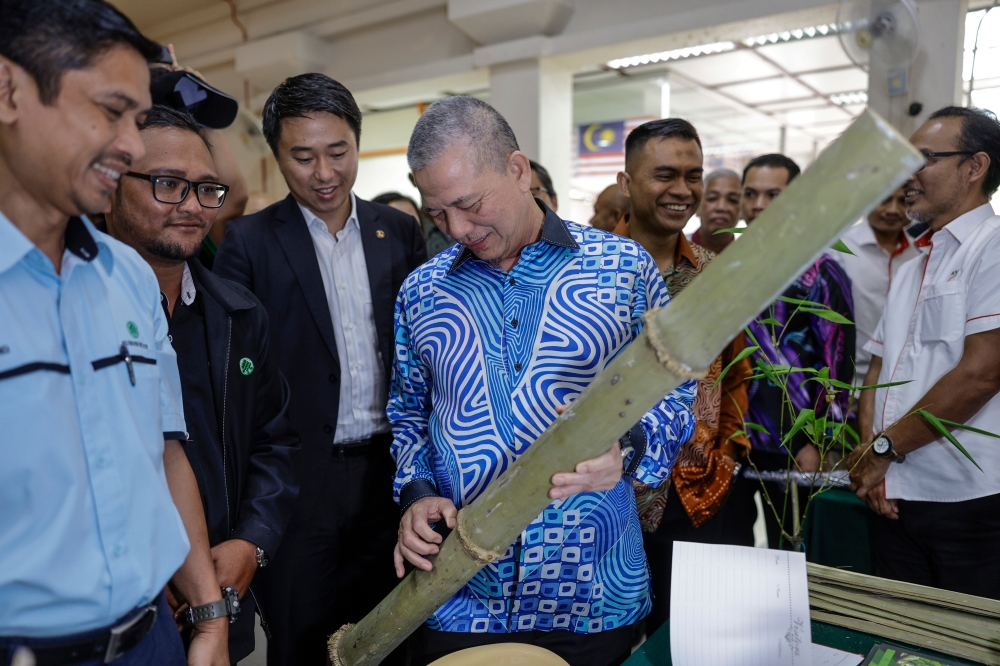KUALA LUMPUR, Sept 21 — The transformation of the bamboo industry needs a holistic approach to create a conducive environment so that the transition of the industry’s structure from a small-scale oriented industry to a downstream industry that produces high value-added bamboo products can be achieved.
Thus, Deputy Prime Minister Datuk Seri Fadillah Yusof urged all parties to be directly involved in the development of the industry by taking proactive steps to ensure reforms occur in the production chain right from the upstream industry to the downstream level.
“In this context, the production of bamboo products that have a high market value needs to be prioritised through innovation, human capital development and the latest technology. This aspect should always be applied among all parties such as entrepreneurs, professionals, researchers, designers, policy-makers and other relevant parties.
“I am confident that with continuous programmes in research, development and encouragement, the bamboo industry will be able to optimise the use of this raw material resource as an alternative source in the timber industry,” he said when officiating the celebration of World Bamboo Day Malaysia 2023 (WBD 2023) here today.
Fadillah, who is also the Minister of Plantation Industries and Commodities, said Malaysia has approximately 70 species of bamboo, of which 45 are local species that grow naturally in forests.
“In terms of plant distribution, 31 per cent of bamboo plants are found in Peninsular Malaysia, 45 per cent in Sarawak and 24 per cent in Sabah.
“In Peninsular Malaysia, the distribution area of bamboo plants is approximately 229,122.57 hectares. Although in terms of the export value contribution of this product is not large compared to other wood products, it has a very large potential to be developed and used as an alternative material for wood in various types of applications,” he said.
He suggested that the Malaysian Timber Industry Board (MTIB) cooperate with the Sarawak Timber Industry Development Corporation (STIDC) to develop the country’s bamboo industry.

Fadillah said that last year, the export value of bamboo products amounted to RM14.46 million, which is an increase of 66.1 per cent compared to the previous year’s RM8.7 million, while the import value of bamboo products for 2022 was as high as RM129.18 million, with products mostly imported from China, Indonesia and Vietnam.
“Currently, there are as many as 577 entrepreneurs who are directly involved in the bamboo-based industry in Malaysia, including the bamboo board industry, furniture, construction, textiles, plantations, food and charcoal as well as handicraft,” he said.
He said to ensure that the bamboo industry continues to thrive, the Ministry of Plantation and Commodities through MTIB drafted the Malaysian Bamboo Industry Development Action Plan 2021-2030 which focuses on five strategic cores.
The five cores are: Policy Strengthening and Resource Expansion; Increase in Human Capital, Expertise and Capacity; Strengthening Innovation, Technology and R&D&C (research, development and commercialisation); Chain Empowerment and Quality Assurance; and Strengthening the Strategy of Smart Marketing and Partnership.
At the event, Fadillah also launched a book entitled ‘Bamboo Charcoal Industry in Malaysia’ which was published jointly by MTIB and the Forestry Research Institute of Malaysia (FRIM).
Also present was FRIM Deputy Director-General (Research) Dr Norwati Muhammad. — Bernama






















